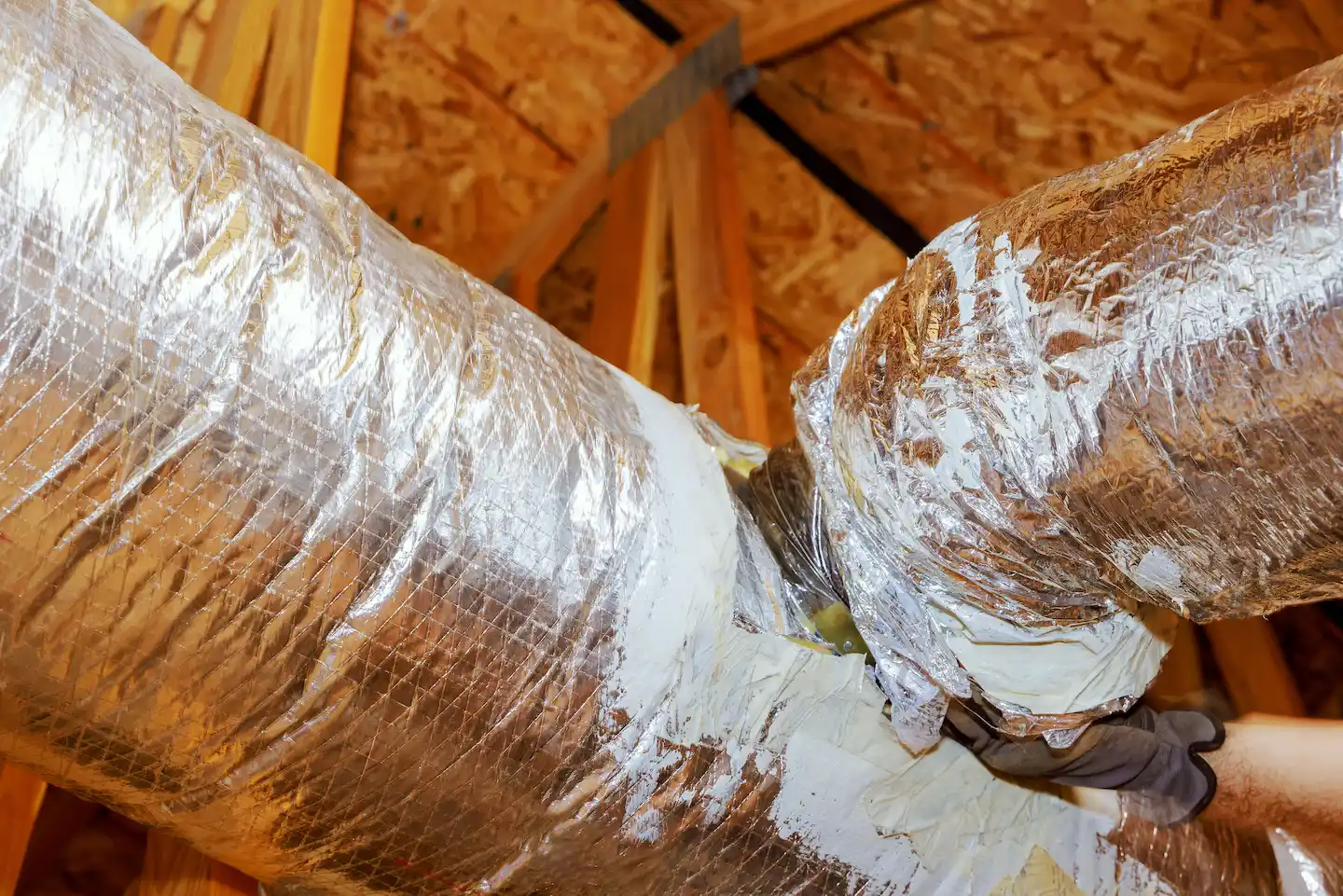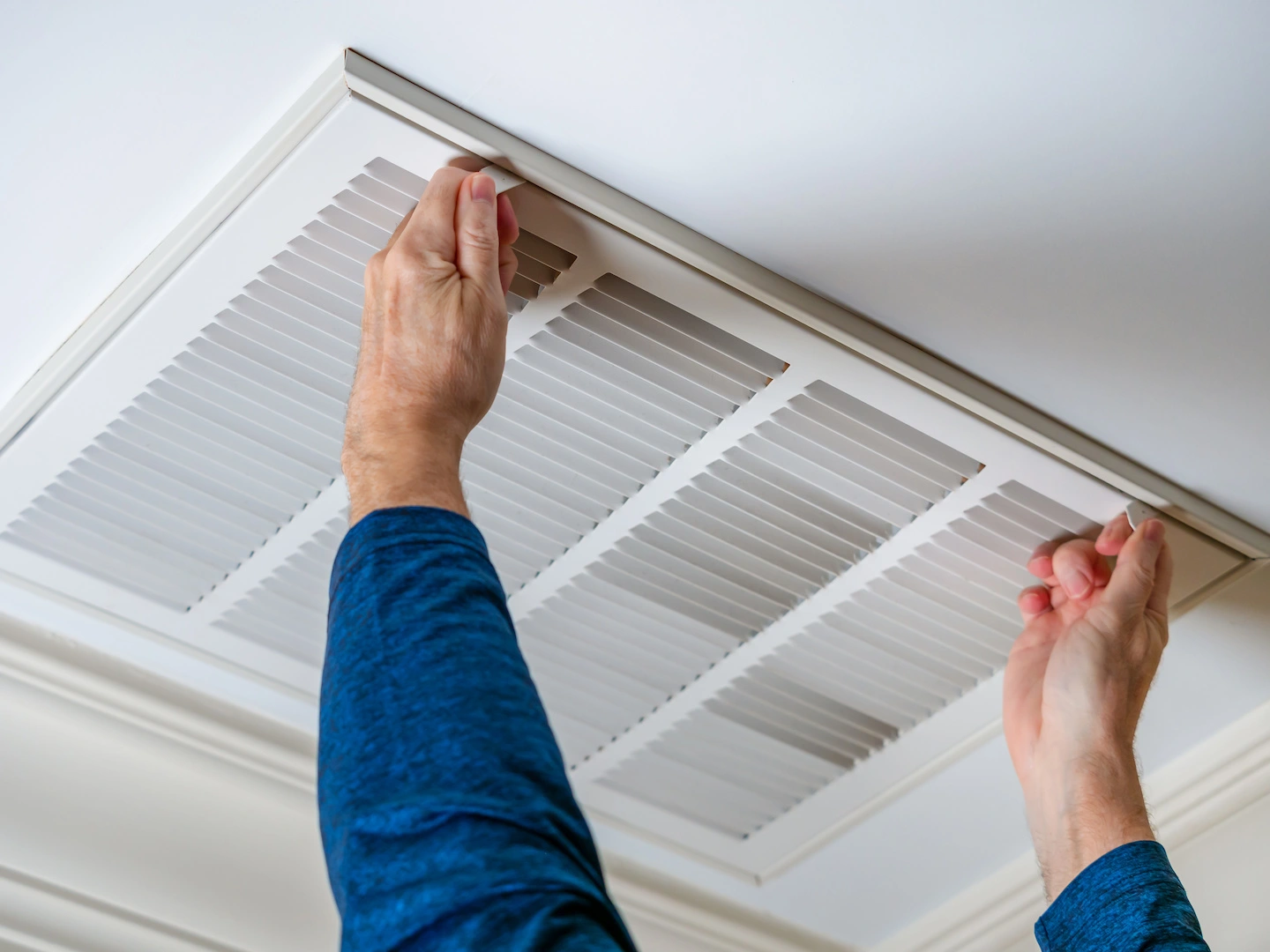If you’ve noticed water dripping from your AC vent, you’re likely dealing with an issue that needs immediate attention. Water leakage can cause damage to your home and indicate a problem with your air conditioning system.
Here are some common reasons you may notice water dripping from your AC vent or ducts, how to fix it, and who to call when you need some help.

What Does the AC Vent Do?
AC vents are the metal pieces that connect the ductwork to the walls, releasing cooled air. The air ducts, or ductwork, is the system of metal shafts the air travels through to get to the different parts of the house. So, if you think you notice water dripping from your AC vent, it’s likely stemming from the air ducts.
Together, these systems play a crucial role in an air conditioning system by distributing cooled air throughout the home and returning warm air back to the system for cooling.
There are typically two types of vents in an HVAC system:
- Supply Vents: These vents blow the cooled or heated air from the AC system into various rooms, helping to maintain the desired temperature throughout the home.
- Return Vents: These vents pull warm air from the rooms back into the AC system, where it is cooled again before being recirculated. They also help to maintain proper air pressure and circulation within the system.
There are three common types of air ducts in an HVAC system:
- Rigid Ducts: Made of galvanized steel or aluminum, these ducts are durable and provide structural integrity.
- Semi-Rigid Ducts: These ducts are more flexible than rigid ones but maintain a defined shape, offering a balance of durability and ease of installation.
- Flexible Ducts: Constructed from a steel wire coil covered with plastic, these ducts are versatile and easy to install in tight spaces but can be prone to kinks.
By facilitating the flow of air, AC vents and ducts work together to ensure efficient temperature regulation, contributing to the overall comfort and air quality of your living space.
Why is Water Dripping from My AC Ducts?
Oftentimes, when you find water dripping from your AC unit or ductwork, it can be due to a lack of maintenance. Without regular checkups and cleanings, your system can build up dust and debris in the drain line or air filters, impacting the quality of air flow and water drainage. Here are some common reasons your vent is leaking, and how you may be able to fix it.

Clogged Condensate Drain Line:
- Cause: The condensate drain line is responsible for carrying away the moisture that the AC system removes from the air. If this line becomes clogged with dirt, algae, or debris, water can back up and leak from the AC vent.
- Solution: Locate the drain line and use a wet/dry vacuum to clear the clog. You can also use a mixture of water and vinegar to flush the line.
Improper Installation or Insulation:
- Cause: If the AC unit or ductwork is not properly installed or insulated, it can cause condensation to form and drip from the vents.
- Solution: Check the insulation around the ductwork and AC unit. Ensure that everything is properly sealed and insulated. If you’re unsure, it may be best to contact a professional HVAC technician.
Frozen Evaporator Coil:
- Cause: When the evaporator coil inside the air handler unit freezes, it can result in water dripping once the ice melts. This can be caused by restricted airflow (due to dirty filters or blocked vents) or low refrigerant levels.
- Solution: Turn off the AC unit to allow the ice to melt. Check and replace air filters if necessary and make sure vents are unobstructed. If the problem persists, it could indicate a refrigerant issue that requires professional attention.
High Humidity Levels:
- Cause: In very humid climates, the AC system may struggle to handle the excess moisture, leading to condensation and dripping.
- Solution: Consider using a dehumidifier to reduce the humidity levels in your home. Ensure the AC system is appropriately sized for your space.

Dirty Air Filters:
- Cause: Dirty or clogged air filters can restrict airflow, causing the evaporator coil to freeze and subsequently drip water when it thaws.
- Solution: Replace the air filters regularly to maintain proper airflow and system efficiency.
Hazards of a Dripping AC Vent
Ignoring water dripping from your AC vent or ducts can lead to serious consequences, not only to your home but also to your health.
Addressing the issue promptly by clearing clogged drain lines, ensuring proper insulation, replacing air filters, monitoring humidity levels, and contacting a professional if needed can prevent these costly and hazardous problems. Some potential hazards involved with a dripping AC unit include:
- Structural Damage
- Mold and Mildew Growth
- Reduced Air Quality
- Damage to the AC System
- Increased Energy Costs
- Fire Hazard
By taking timely action, you can protect your home, health, and wallet from the negative impacts of unchecked water leakage.
When to Call a Professional
If you’re unable to identify or fix the problem on your own, it’s advisable to contact a professional HVAC technician. At TemperaturePro Columbus, we offer expert AC repair services and our technicians are all highly trained and certified. We can inspect your AC system to prevent further damage and get it back to operating safely and efficiently.
By understanding the common causes, potential solutions, and who to call when you need a hand, you can make sure the water dripping from your AC vent or ducts is solved rapidly and accurately!

